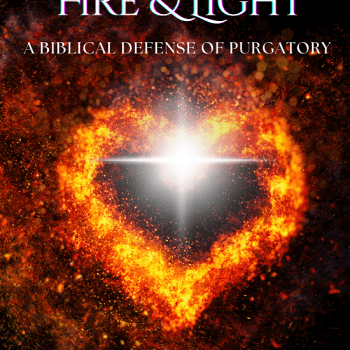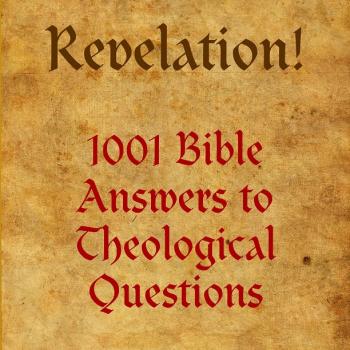
From Henry’s “About Page” for his Patheos blog:
Henry C. Antony Karlson III has done considerable amount of graduate work and study in philosophy, theology, and comparative religious dialogue. He has taught as an adjunct at both Georgetown University and the Catholic University of America. He seeks to engage his readers with a diversity of topics, some cultural, some philosophical, some theological, but all for the glory of God. He is a Byzantine Catholic, who, before establishing his own blog on Patheos, used to be one of many writers on Vox Nova. He has had articles published or republished on many other sites including The Interfaith Observer, Orthodoxy in Dialogue, and Eclectic Orthodoxy.
In 2017, Henry Karlson’s book, The Eschatological Judgment of Christ: The Hope of Universal Salvation and the Fear of Perdition in the Theology of Hans Urs von Balthasar, was published by Wipf and Stock.
Henry is at it again: offering more of what seems to be an ongoing vendetta with him: bashing apologetics: always with saving qualifiers (to the effect of, “not all are this way” etc., and lacking the guts to ever name names), yet with an unmistakable general animus. Today’s blast is entitled, “Apologists Should Not Be Sophists” (12-19-19). Isn’t that a lovely, edifying title? I’ve often noted with a big chuckle how apologists are so often the “whipping boys” for the ire and indignation of certain critical folks in the Catholic Church.
Why is it we never seem to see articles with titles like “Liberal Byzantine ‘Independent’ Theologians Should Not be Sophists” [Henry’s Amazon author blurb describes him as an “independent scholar”] or: “Catechists Should Cease Seeking Glory for Themselves” or: “DRI’s Have a Terrible Attitude Problem” or: “Catholic Professors Should Not be Arrogant and Full of Themselves”? LOL
It seems to so often be us lowly apologists who are the targets. Why is that? Is it manifest that we suffer more terribly from the usual range of human faults and shortcomings than anyone else? I don’t think so. We’re sinners just like the rest of y’all: I don’t think we’re any better or worse than any other large social group (and I’ve been around the block a few times in many such groups: now at age 61).
I know a great many Catholic apologists personally. Many are very fine, pious, praiseworthy persons as persons (and among the people I admire most); others — yes, in the usual percentage — have some glaring faults: including the desire for glory and a certain obnoxious arrogance that Henry likes to highlight.
But again, I see no huge discrepancy between the professional class I’m in and other major groups, to warrant Henry discussing apologists and apologetics in the sweepingly negative way in which he does. I think, then (just my opinion, after long experience with these sorts of criticisms) that the bashing flows from an existing dislike and contempt for the art and practice of apologetics itself (where that comes from would require another huge discussion).
This then gets extended to persons: as if they — as a class — suffer from some huge moral deficiency and profound blindness: which has, of course, been avoided by persons like, for example (just pulling an example out of thin air), Byzantine independent scholars. Basically, Henry seems to contend that to engage in apologetics — especially debate within apologetics –, is, by its very nature arrogant, The one who does so is, by and large, unable to be corrected, and is closed-minded and full of himself or herself. This is, sad to say, a classic expression of prejudice or bigotry.
I could go on, but there is little need. I’ve expressed the gist of what I’m trying to say. What follows are Henry’s potshots at apologetics and apologists: all his own words; save for my added categorizations and just two “footnotes”:
“Many” / “Most” Apologists Are Bad, Arrogant, Prideful People
While, in theory, the field of apologetics can do quite a bit of good, if it truly seeks what is true and offers to explain what others have erroneously misunderstood, many, if not most, who become apologists seek to speak in order to gain praise and glory more than they do in order to truly understand and defend the truth. (“Apologists Should Not Be Sophists”, 12-19-19)
[M]any apologists . . . like to be noisy gongs clanging about what they think they can prove. But the thing is the ugliness of their attitude, the self-promotion which they engage, turns people away; whatever limited value can be had in their presentation is overturned by their useless clanging. (“Reform, Not Apologetics, Is Needed To Help People Return To The Faith”, 6-30-19)
Apologists — Even Professional / Published Ones, Are “Self-Appointed” and Somehow Illegitimate
. . . so-called apologists . . . (“Apologists Should Not Be Sophists”, 12-19-19)
Apologetic Debate is Pretty Much a Bad Thing
It is common in the modern field of apologetics to be promoted by debates, and through such debates, so-called apologists learn to dismiss what their opposition has to say instead of sitting down, listening, and learning from them. . . . The reality is that the truth is not only difficult to discern, but often, it is inconvenient, and when apologists hear something inconvenient, they would rather ignore it than engage it and modify their own understanding because of it. (“Apologists Should Not Be Sophists”, 12-19-19)
What Augustine shows us that it is better to admit when someone else, including a critic of our own beliefs, have truths in common with us than it is go on and on debating them on every point they make. It is better for apologists to not always be on the defense, but actually to be looking for and pursue the truth wherever it could be found. . . . This kind of apologetics is what is lacking today, and it is this reason why many Christians, relying upon apologetics for their education, have a faulty understanding of the truth. For such Christian then learn half-truths and misrepresentations of the other while, allowing them to give an erroneously triumphalistic, interpretation of their own tradition. (“Apologists Should Not Be Sophists”, 12-19-19)
Apologists Have a Greater Tendency to Pride and Never Admitting They are Wrong, Than Most Other Folks
They would rather be shown refuting their critics than losing face within their own community. This is especially true when apologetics is done through debates; apologists think it appears weak, and they will lose the debate, if they admit their opponent has something to offer. . . . They market themselves as being concerned about the truth, but the way they act and interact with others, demonstrates they care more about defending their own reputation and honor than the truth itself. (“Apologists Should Not Be Sophists”, 12-19-19)
Certainly, this could merge with the field of apologetics, though a serious engagement with the faith of others should not end up as a simplistic, triumphalistic analysis of what is wrong with the other, but a discernment with the questions the other raises and the positive theological answer which can be given to such questions. (“Engaging Others Through Comparative Theology”, 2-25-19)
Apologists Morally Compromise Themselves in Their Constant Marketing and Self-Promotion
That is one of many problems which can be found in apologetical circles. Certainly, not all apologists are guilty of this. . . . Nonetheless, especially when people engage apologetics as a profession, this becomes a distinct problem. Many apologists learn that they have to market themselves, and it becomes next to impossible for them to do so if they are seen continually accepting arguments from their opponents. (“Apologists Should Not Be Sophists”, 12-19-19)
. . . the self-promotion which they engage, . . . (“Reform, Not Apologetics, Is Needed To Help People Return To The Faith”, 6-30-19)
Apologists are Mere Sophists, Who Care Little About Truth
Sadly, because of how the field of apologetics has emerged in recent times, it often appears that apologetics are sophists, caring more about appearances and the kinds of rhetorical arguments they can make than they are about the truth. . . . This generalization must not be seen as indicating all apologists are sophists. (“Apologists Should Not Be Sophists”, 12-19-19)
Apologists Think That Their Field Replaces Faith Itself (Excessive Rationalism) and the Necessity of Good Works
In dealing with the current crisis of the church, when we see many people lose faith and leave the church, some think that the solution is to promote more catechesis and apologetics. They think the problem is that people do not have a sufficient understanding of what the church teaches, and so if someone would explain to those who have fallen away from the faith the church’s doctrines, they would swiftly return to the fold.
Not only is this a simplistic solution to the crisis, it presents a poor understanding of the faith itself. It presupposes that faith is solely about what one understands about doctrine; this suggests that those who have the most education will be those who have the most faith. If someone has a problem, the solution is to study and they will find out the problem is meaningless. If you don’t know where to turn, listen to the best apologists, to those most skilled in debates, and accept what you hear. Is this really a good answer? Is this really the answer of the faith itself? No.
There is value in study. There is value in knowing Christian doctrine, and what it says and does not say. But to limit the faith to such is to turn it into something very human, something unmystical, something that is merely the letter of the faith without its spirit. Such an understanding of the faith promotes useless arguments and sophisticated debates instead of the faith itself. While a mature faith is a faith seeking understanding, it is also a faith which is manifested in works and not in useless arguments and rules. A proper faith is holistic, and with the loss of this holistic integration of truth, goodness, and beauty for the sake of a pseudo-rationalistic apologetics, the faith presented will not be a faith worth following.
The rise of modern Catholic apologetics coincides with, and is formed by, a culture of debate; at first glance, it might seem to offer a way for people to come to faith, but because it offers a humanistic enterprise without mystery, indeed, because it decries such mystery with its attempt to be ultra-rationalistic, what it gains with its rhetoric it loses two-fold when people see beyond the rhetoric, noting that there is nothing substantial left for them to hold to in faith. When there is a crisis of faith, apologetics cannot provide what the soul needs. It does not offer authentic spiritual food, because it tries to divert someone away from what has caused them to have a crisis of faith in the first place. Such a diversion might work in the short term, but in the end, its emptiness will become apparent and substantial spiritual food will be looked for elsewhere. If such apologetics is seen as all that is to be offered, then what is offered will be rejected. We need to integrate our whole selves, mind, body, and soul, with Christ. There is value in study, in intellectual pursuits, but to make it the whole of our faith will neglect the faith itself. (“Reform, Not Apologetics, Is Needed To Help People Return To The Faith”, 6-30-19; I thoroughly answered this sort of wildly unwarranted and unjustified accusation with my article, Apologetics: Be-All & End-All of the Catholic Faith? NO!!! [7-1-19])
As heresy is the promotion of a partial element of the truth against the fullness of the truth, apologetics easily leads to and promotes heresy as does not seek to cede itself to the fullness of the truth but rather present particular apologists as representatives of its fullness. Many apologists establish only a simulacrum of the faith as they present a rationalistic, human-centered, way to comprehend the faith, while the truth itself is beyond our comprehension and will transcend what our reason can establish. Those who follow what is presented by such apologetics as the fullness of the faith will lose the transcendent mystery of the faith itself, the transcendent glory, and so eventually will find what they possess does not satisfy. The crisis of faith will return once this has happened.
To live well, to integrate the truth which is understood into our lives, and to unite truth and goodness, allows the beauty of such truth to attract and overcome the insufficiencies of a purely rationalistic approach to the faith. The church needs its leaders, indeed, all Christians, to live well, to present the holy life. This, more than simple apologetics, is what will help the church deal with its present crisis (and any future crisis as well). . . . The answer must be that the church itself needs authentic conversion to Christ, that is, metanoia. Until then, apologetics, and those who seem to promote it, will never satisfy. (“Reform, Not Apologetics, Is Needed To Help People Return To The Faith”, 6-30-19)
Apologists Who Are Converts from Protestantism, Still Think in Non-Catholic, Protestant Ways
This is exactly what lies behind the problem many have documented of former Protestant apologists making their way in the church, becoming a voice of authority through their work: they continue to think with a Protestant mindset which puts themselves and their reasoning and arguments at the center of their personal faith. This leads them to think that they are the judge of right and wrong, of truth and error. What this means is that their conversion was incomplete because they have yet not died to the self. They believe, to be sure, but they believe in a set of doctrines which they have concluded as true and they will follow the church because the church teaches according to their own personal conclusions and for that reason alone. They assume their way is the truth and so are not willing to be corrected but instead end up thinking they need to correct the church when the church does anything contrary to their own personal expectations. (“Truth Transcends Expression Of The Truth: On The Silence Converts Should Have Before Teaching The Faith”, 9-4-17)
This can be seen in the way so many convert-apologists have been the loudest in protesting Pope Francis in many of his pastoral initiatives. They assume facts which were not true, such as those fighting Pope Francis in relation to his pastoral initiatives on marriage. They presume and discus a past which never existed, and then pit it against the Pope saying he is undermining Christian teaching on marriage because he is engaging the people pastorally in a way which understands the whole history of Christian treatment of marriage and not their own modernistic interpretation of it. It is not hard to see that, if and when it is Protestants converts we find arguing in this manner, it is because their former ways of thought continue with them: but what of those who were raised Catholic who now also think the Pope is betraying the church’s teachings and practice? Sadly, they look up to convert-apologists for their faith, and so the blind converts lead the blind Catholics against the Pope, with a Protestant sensibility overriding the more complex and Catholic understanding of pastoral concerns. (“Truth Transcends Expression Of The Truth: On The Silence Converts Should Have Before Teaching The Faith”, 9-4-17; I would note that Jimmy Akin and myself: perhaps the two most active defenders of Pope Francis among apologists, are both converts)
Apologists Ignore and Deny Problems and Sinners in the Church
The history of the church shows that many ecclesial authorities have committed abhorrent crimes. To ignore the deficits of the bishops, to ignore the crimes of the clergy, to ignore the way innocent, good people have suffered at the hands of church officials might make for a form of apologetics, but it harms any authentic attempt to understand church history and the reality of the evil which is found side by side with the good. (“Admit and Condemn”, 8-21-18)
[Latin] Apologists Unduly Defend Things Like Priestly Celibacy, as if it Were a Dogma
They have long defended the tradition of celibate priests in apologetics that they have turned it something more than a discipline fitting for a particular time and place, but have seen it as perfection itself (ignoring all the married priests who were also saints) – this indeed is a part of the problem of an apologetical culture which goes too far in its defense as it tries to make too many claims about a particular practice or discipline as if it was the best of all possible disciplines (when, of course, all discipline should serve the people and their particular needs and not the other way around, for, as Jesus said, the Sabbath was made for us). (“Diversity in Unity”, 11-1-17)
***
Photo credit: Mark Morgan (12-6-14) [Flickr / CC BY 2.0 license]
***













